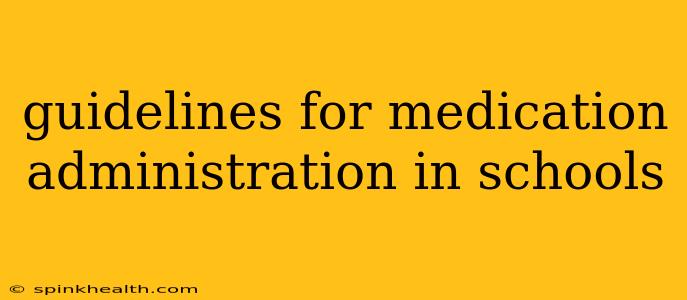Guidelines for Medication Administration in Schools: A Comprehensive Guide for Parents and Educators
The school bell rings, signaling the start of another day filled with learning and growth. But for some students, navigating the school day also means managing their medication. Ensuring safe and effective medication administration in schools is a crucial responsibility shared by parents, school nurses, teachers, and administrators. This guide delves into the essential guidelines and considerations involved in this critical process.
It began, as many important things do, with a simple question: how can we best support students with medical needs so they can fully participate in their education? This simple question has evolved into a complex, but vital, system of regulations and best practices aimed at ensuring both student health and safety.
Understanding the Legal Framework:
Before we dive into specifics, it's crucial to understand that medication administration in schools operates within a robust legal framework designed to protect student privacy and safety. These regulations vary slightly depending on the state and even the individual school district, so it's vital to consult with your school's nurse and administration for specific local protocols. These regulations often emphasize the importance of parental consent, detailed documentation, and staff training.
What types of medication are typically administered in schools?
This is a common question parents often have. Schools typically administer a range of medications, including but not limited to:
- Over-the-counter (OTC) medications: For minor ailments like headaches or stomach aches, often with parental consent forms specifying the type and dosage.
- Prescription medications: These require a comprehensive doctor's order and often more rigorous documentation procedures. This can include medications for ADHD, asthma, allergies, or other chronic conditions. These medications demand precise administration.
- Emergency medications: In cases of severe allergic reactions (e.g., anaphylaxis), schools must have protocols in place for immediate medication delivery (typically epinephrine via an EpiPen). This requires specific training for designated staff.
What is the role of parental consent in medication administration?
Parental or guardian consent is absolutely essential. This isn't merely a formality; it's a legal requirement that protects the child and holds the school accountable. Consent forms typically include detailed information about the medication, dosage, administration schedule, and any potential side effects. These forms often need to be reviewed and updated periodically. This ensures that everyone is informed and on the same page.
What training do school staff receive to administer medications?
Staff members authorized to administer medications receive specific training. This training encompasses not only the practical aspects of medication administration (correct dosage, route of administration, etc.) but also crucial knowledge of potential side effects, emergency procedures, and the legal implications of their actions. Regular refreshers are essential to maintain competence and address any updates in best practices or relevant regulations.
How is medication stored and secured in schools?
Safeguarding student medication is paramount. Schools typically employ locked medication cabinets or secure storage systems, accessible only to authorized personnel. These systems maintain medication integrity and prevent unauthorized access, minimizing the risk of accidental ingestion or misuse. This commitment to security underscores the seriousness with which schools approach medication management.
What documentation is required for medication administration in schools?
Detailed and meticulous documentation is crucial for legal compliance, accountability, and patient safety. This documentation includes the medication's name, dosage, administration time, and any observed side effects. This record-keeping provides a clear audit trail, ensuring compliance with regulations and assisting in the identification and management of potential adverse events. Accurate records are not just good practice—they are essential.
What are the procedures for handling medication errors?
Despite meticulous procedures, medication errors can unfortunately occur. Schools must have clear procedures for handling such incidents, including reporting protocols and strategies for minimizing the risk of recurrence. These procedures often involve immediate notification of parents/guardians and the student's physician. A comprehensive approach to error management underscores a commitment to continuous improvement and safety.
Conclusion:
Successfully navigating medication administration in schools requires a collaborative effort between parents, school personnel, and healthcare providers. By adhering to established guidelines, fostering open communication, and emphasizing the importance of training and documentation, we can create a safe and supportive environment for all students, allowing them to focus on their education and well-being. It's a system that relies on shared responsibility and a dedication to the health and safety of every child.

